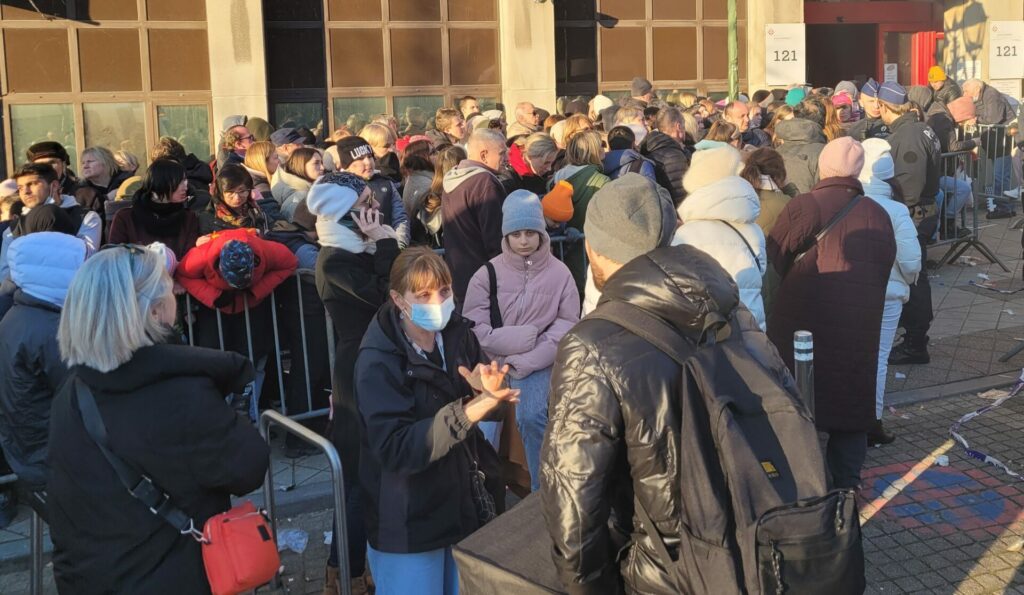Long-time resident and new Belgian Gareth Harding shares his thoughts about life in Brussels and Belgium
The best and the worst of Belgium has been on display this month as the country grapples with how to welcome tens of thousands of refugees fleeing the war in Ukraine.
On the plus side, the reaction from the public has been extraordinary. As refugees arrived in Brussels they headed to register with authorities near Porte de Hal. There they were greeted by a small army of volunteers brought together by pop-up Facebook groups like Solidarity with Ukraine and more established organisations like Serve the City.
Within hours of the first arrivals, tables had been laid out with drinks, biscuits, sandwiches, toiletries, clothes, baby products and other essentials. A double-decker bus was converted into a makeshift soup kitchen and emergency sleeping area. And a play area with toys, dolls and games was set up with musicians and entertainers keeping kids amused.
Meanwhile the Ukrainian refugees - overwhelmingly women and children - queued patiently for hours, sometimes days. “They are giving us a lesson in dignity,” said one volunteer, helping a 79-year-old look for warm clothes.
Many refugees were traumatised by the loss of loved ones, the war they had witnessed on their doorsteps, the anxiety of being away from families and friends and the long, arduous journey they had experienced. One teenager jumped with fear when he heard a loud boom. When we pointed out it was not an explosion but the rumble of the metro below, he relaxed a bit.
In addition to greeting new arrivals and donating money and clothes, thousands of people in Belgium have opened up their homes to refugees – some through official channels like local councils but most through Facebook posts, WhatsApp pleas and chance meetings at registration centres.
The two families we are hosting fled Luhansk five years ago when Russia-backed separatists seized control. They were then forced to leave Kiev as Russian troops advanced on the capital. Now the mums anxiously show me videos of shells exploding around the apartment bloc their husbands are defending, while their three kids are busy at school.
While the response of the public has been heart-warming, the reaction of Belgian authorities has been confusing and chaotic.
The mass exodus of millions of Ukrainians has been predicted for months. Yet when refugees started arriving in Belgium at the beginning of March, authorities were woefully unprepared. “In most countries you hope for the best but prepare for the worst,” says Erik Van Wolvelaer, one of the organisers of Solidarity with Ukraine. “But here we just deal with the worst when the worst is already happening. It’s a very Belgian thing.”
Unlike in Germany, where I witnessed thousands of Ukrainians being welcomed calmly and methodically at Berlin’s central station in the first days of March, refugees arrived in Brussels with minimal help and a mishmash of conflicting information. They then trudged to register at Porte de Hal, where they had to queue outside.
“The reception is catastrophic,” said Delegate General for Children’s Rights Bernard De Vos. “Refugees are forced to wait in the cold, with blankets, and without toilets until yesterday. I had the impression of being in a situation similar to what I saw last week at the Ukrainian border – this is not reasonable.”
After almost a week operating out of the cramped quarters at Porte de Hal, authorities announced that registration would take place in the shadow of the football stadium at Heysel. Volunteers were told their job was done as they expected refugees would wait indoors, with seating for old and infirm people and plentiful supplies of food and drink.
“Deception,” was Aleksandra Lemanik’s response as volunteers checked the new reception facilities. A snaking queue wound through a windswept park where hundreds of Ukrainians waited outside. Initially there were no toilets - the responsibility of the interior ministry at Porte de Hal and the Brussels region in Heysel. “It wouldn’t be Belgium without at least five agencies involved,” said Van Wolvelaer.
Volunteers regrouped to offer food, drink, clothing and toiletries to those waiting in line. But on the first day, police told the volunteers they had no right to operate in the park, so they decamped to a busy road several hundred metres from the queue.
“I came here because Belgian websites showed that there are good facilities here, but that is propaganda,” said one man, who had already been queuing for three days after a week-long odyssey from Kiev. “The system doesn’t work, the government doesn't work. If the centre wasn't ready, why did they open it?”
By the end of March the situation had slightly improved with the creation of an online registration system and a covered queuing area at Heysel. But that was a month too late for thousands of refugees who expected more and deserved better.
Some Belgians take a perverse pride in the country’s chronic disorganisation and disjointedness. At a recent meeting I attended with cultural bigwigs, many extolled the virtues of chaos, proudly declaring: “Ici c’est un grand bordel, mais on l’aime comme ça.” Well, chaos may be great for creativity, but it’s no way to run a country. And it’s certainly no way to greet vulnerable people craving clarity and searching for security.
What does Belgitude mean to you? Share your thoughts on Twitter, Facebook and Instagram. You can also follow Gareth on Twitter @garethharding

